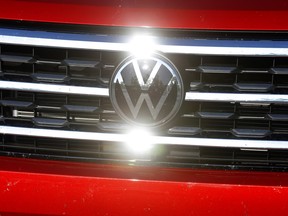Volkswagen commits to considering Canada for its first North American EV battery factory
'This is just the beginning'

Article content
Volkswagen AG will explore sites in Canada to build the company’s first battery factory in North America to power electric vehicles (EV) as per an agreement that the automaker inked with the Canadian government on Thursday.
The agreement is an extension of a memorandum of understanding previously signed between the two parties in August that aims to “deepen” co-operation on the building of EVs.
Volkswagen Group chief executive Oliver Blume said in a press release that Canada was a “logical option for the construction of a gigafactory” in North America because the country offers “ideal economic” conditions.
“This is just the beginning,” Blume said. “The EV market in North America is at a turning point and we’re committed to investing across the entire region.”
The deal has been signed at a time when the United States, the bigger European economies, Canada and other democratic economies are looking to shift their industries’ supply chains away from China, which dominates the EV industry, and towards friendlier nations.
One of the best examples of this is Washington’s recently passed Inflation Reduction Act (IRA), which offers a US$7,500 subsidy for EVs that are made primarily from materials sourced in North America.
The EV market in North America is at a turning point and we’re committed to investing across the entire region
Oliver Blume
The legislation was seen as a win for Canada’s mining industry, which is excited to supply the critical minerals needed to build electric vehicles. In late October, Prime Minister Justin Trudeau’s government raised the bar that foreigners must clear to join Canada’s critical minerals industry, saying any attempt by a state-owned enterprise to purchase assets in the sector can now trigger a section of the Investment Canada Act that determines whether deals that could be “injurious to national security,” requiring lengthy review.
Days later, Ottawa ordered three Chinese companies to divest their investments in three Canadian junior lithium miners.
Deputy Prime Minister Chrystia Freeland used a series of speeches this fall to stress the need for “friendshoring,” an idea that would see democratic allies build supply chains through each other’s economies and tackle the influence of authoritarian regimes in the energy sector.
All told, the strategy appears to be working, although it’s still early days. Aside from Volkswagen AG, the country also signed a similar deal with Mercedes-Benz AG in August during German Chancellor Olaf Scholz’s visit to Canada, although Mercedes hasn’t yet committed to significant investment.
And earlier this year, Ottawa signed deals with Belgian materials technology group Umicore SA, Stellantis NV and LG Energy Solution Ltd. to build cathode and battery factories.
The demand for EVs and other renewable materials has increased in recent years as countries accelerate towards meeting their climate goals.
“As the world transitions to a cleaner and more sustainable economy, Canada’s highly-skilled workers will be key in helping to build the green vehicle of the future. Today’s announcement between Canada and Volkswagen represents another major step forward,” Industry Minister François-Philippe Champagne, who signed the deal on behalf of the federal government, said in a statement.
Volkswagen also said that its battery company PowerCo SE, founded in July, signed an agreement with Umicore to look for ways to secure cathode materials, that are used in batteries, from Canada.
The news comes a couple of weeks after Brazil-based Vale SA signed an agreement to supply General Motors Co. with 25,000 tonnes of battery-grade nickel sulfate annually from the miner’s proposed plant at Bécancour, Que.
The nickel feed will be used in GM’s battery cathodes to power about 350,000 electric vehicles annually.
• Email: nkarim@postmedia.com | Twitter: naimonthefield



Postmedia is committed to maintaining a lively but civil forum for discussion. Please keep comments relevant and respectful. Comments may take up to an hour to appear on the site. You will receive an email if there is a reply to your comment, an update to a thread you follow or if a user you follow comments. Visit our Community Guidelines for more information.